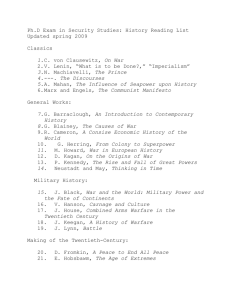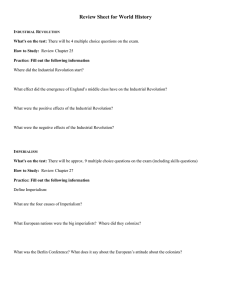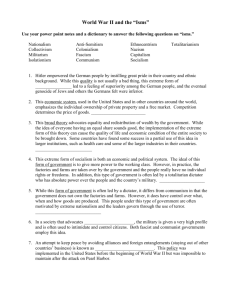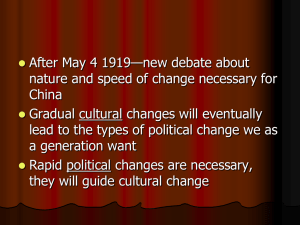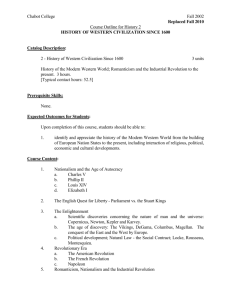New Culture/May Fourth Movements 1915-1926
advertisement
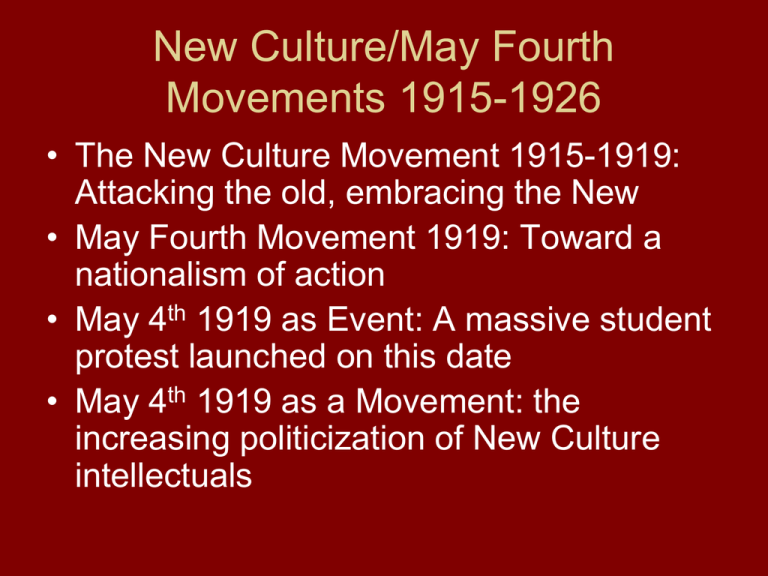
New Culture/May Fourth Movements 1915-1926 • The New Culture Movement 1915-1919: Attacking the old, embracing the New • May Fourth Movement 1919: Toward a nationalism of action • May 4th 1919 as Event: A massive student protest launched on this date • May 4th 1919 as a Movement: the increasing politicization of New Culture intellectuals Chen Duxiu 陈独秀 (1879-1942) Founder of “New Youth” 新青年 in 1915 Becomes a young professor at Beijing University, ground zero for New Culture and May 4th Movement (more on Friday) An early Chinese marxist and founding member of the Chinese Communist Party Author of “A Call to Youth” Lu Xun (Lu Hsun), 1881-1936 • Highly Influential Writer of the New Culture Generation • Pioneer of using vernacular in his writing—a literary revolution • Stories injected with a strong sense of social consciousness New Culture Movement vs. Confucian Tradition • Iconoclasm: a complete unwillingness to accept the norms and assumptions of traditional Confucian culture • Attack on family values • “Youth” rises to the forefront of nationalism • A new emphasis on the individual, individual rights • Total faith in “science” • Rights of Women May 4th 1919: The Event • Reaction to Versailles Agreement, gives German colonial possessions in China to Japan—not back to China • Student’s hit the streets in protest—the first national student protest of its kind • A blueprint for student action, student nationalism is born • Wilsonian liberalism vs. Leninism: two competing versions of anti-colonialism in the post WWI era. Student Nationalism • A new repertoire for student action is born • Power of mass movements • New tactics, new organizations: strikes, street-side lectures, boycotts, student unions • Renewed sense of urgency Changing face of Chinese nationalism • Nationalism after 1919: • --Political centrality—federalism, quasi independent provinces lead to chaos, warlords, weakness—new demand for a strong, centralizing regime • --The Masses—how to reach “the people”—to what extent should the people be active in political process, in the revolution? How are things that these intellectuals talk supposed to reach and mobilize the people? • Do the Chinese people possess something that can be harnessed to bring them to the very center of the revolutionary process? • How do you achieve all of this? New debate on the nature and speed of change • Cultural change first-- political change will follow: most importantly, this happens gradually • Political change first, cultural change will follow: do it fast, do it now Hu Shi (1891-1961) 胡适 • leading voice for a kind of liberal pragmatism • evolution not revolution • Opens the debate with an article: “More Study of Problems, Less Talk of Isms” • Don’t cling to “isms” like Marxism, etc. as all for one solutions to China’s problems Li Dazhao (Li Ta-chao) (18891927) 李大钊 • First to interpret and spread Marxism in China • Revolution not Evolution • Direct political action now • Marxism is an allencompassing solution for China’s problems • Influenced by success of Russian Revolution 1917

